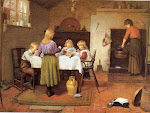Got back from the Living Education Retreat in Windom, MN this past weekend just full of new ideas and so much inspiration! I anticipate the best school year yet happening... :)
So this weekend focused on Science. Ah, the dreaded subject of dry textbooks and even drier experiments.... Or is it? Does it really have to be dry and boring? Does it have to be dull? Do the experiments have to be pre-canned and only work like "magic" with no relevance to real life?
According to Charlotte Mason, the answer is a resounding NO! Studying nature in detail, drawing or painting it, narrating it, reading real living books on a variety of subjects - these will all inspire students to create their own experiments and their own "Aha!" moments.
So what does one use in the study of science in a Charlotte Mason education? Nature! Get out there, even in your own yard, and ID things you've never seen before. Draw them in your nature notebook in as much detail as you can, then write about it. Collect things that interest you - rocks, feathers, seashells, insects, you name it! In your Book of Firsts, record the day you see the first spring robin and flower, the day you see the first snowflake, the weather that day, precipitation, moon phases. Compare them from year to year. As you read, write down info on scientists and discoveries in your Book of Centuries. Pay attention to current events related to science, such as space exploration or new species being discovered. Read, read, read lots and lots of living books. These stories are intriguing, in story form, and if they have illustrations, they are works of art and beautiful. These books lead students to conduct their very own experiments ("hmm, how can a wire under water transmit sound??? Does that really work? Let's try it!"). Students record their observations in their lab books, a journal of their scientific discoveries. The teacher spreads the feast of books and opportunities - the student makes all the connections on his or her own.
I see this happening every single day with my children. They read constantly, and they're constantly acting things out that they've read about or trying something they read in a book. It's not just play-acting history or literature, but they are experimenting with the world around them. They are studying God's majestic creation as they look at flowers or bugs or even just dig in the dirt. They are keeping that sense of wonder about creation that most of us have lost with a traditional approach to science education. I am so thankful for the opportunity to attend the Retreat and learn more about Charlotte's incredible philosophy of education. And I know I will learn even more next year!
Wednesday, August 15, 2012
Subscribe to:
Post Comments (Atom)


No comments:
Post a Comment